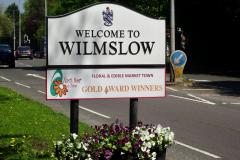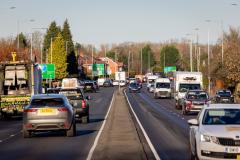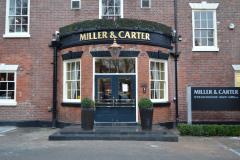In May we lost 2 men - one on land, the other at sea. The first of our local fatalities was Private Albert Thirwall (14157). He was one of 7 children born in 1889 to Frederick and Alice Maud of the Hough, Macclesfield Road, Wilmslow.
Albert worked as a domestic gardener for Mr Reginald Le Neve Foater of Fulshaw Cottage - a research chemist associated with the production of Phenol. Albert was a keen footballer with Wilmslow Town Football Club, but joined up early with the 10th Cheshires. He was killed in action by an exploding shell on 20th May. He has no known grave, but is commemorated on the Loos Memorial and on Wilmslow and St Bart's memorials.
The Thirwall grave in St Bart's graveyard reads: "In loving memory of Alice Maud the beloved wife of Frederick ......... also their beloved sons Albert and Stanley who were killed in action ......." Stanley was to die with many friends in Gaza in November 1917. He and Albert are both remembered in the Methodist Chapel of Mottram St Andrew. Mercifully their brother Frank (born 1895) served and survived the war.
Eleven days after Albert's death, Petty Officer Frederick Kettell (236408) of the Royal Navy, died along with all his fellow crew. Their armoured cruiser HM Black Prince exploded after it was set on fire by salvoes from a German Dreadnought at the Battle of Jutland - the only full fleet battle of the Great War. Fred was commemorated on the brightly coloured and tiled war memorial plaque in the old Morley Green Congregational Chapel along with 8 other young men. When the chapel built in 1869 was closed as the URC in 2010 their remaining funds were given towards a public memorial in the centre of the village. Fred is also remembered on the civic memorials in Wilmslow and in Portsmouth.
Fred was one of 3 children born to David and Sarah in 1890 in a colliery village near Kidsgrove. He worked as a brass moulder in the Potteries before joining the navy as a "boy seaman" in 1906. He was living in Portsmouth in 1911 and by then had had many postings including time on the gunnery training school HMS Excellent and the first battle cruiser in the world - HMS Invincible. He joined the Black Prince in 1914 and married Ada Johnson at St Bart's in November 1915. At the time of Fred's passing Ada lived at Brook Cottage in Morley before subsequently moving to London.
Fred, like hundreds of others suffered from defects in British ship design and tactics, and the initial overconfidence of the navy. Since the start of the war, we had blockaded Germany by patrolling the waters between Scotland and Norway and the Straits of Dover. The Germans were suffering from shortages.
The new commander of the German High Seas Fleet, Admiral Reinhard Scheer, hoped to erode our strength by enticing elements of our Grand Fleet into a series of isolated actions in unfavourable circumstances. Accordingly their fleet left the North German coast. The British fleet were split. Admiral Sir John Jellicoe's 24 huge Dreadnoughts left Scapa Flow whilst Vice Admiral Sir David Beatty's 9 lightweight battle cruisers sailed from Rosyth. The German battle cruisers under Vice Admiral Franz Hipper met Beatty's hoping to lure them onto Scheer's battleships before Jellicoe could arrive.
Our battle cruisers were silhouetted against the western sky and came under heavy fire at a range of 18,000 yards. Beatty was a flamboyant commander with a streak of impetuosity - in order to achieve rapid firing he insisted on storing ammunition near the gun turrets and opening all corridor doors between the guns and the magazine. A flame from a direct hit would thus spread through the ship with fatal consequences; such was to happen to 3 battle cruisers as well as to the Black Prince - Fred's ship. Both giant Dreadnought fleets later on engaged in battle; no ships were sunk but here British firepower told. The wounded Germans escaped by night to their bases under cover of fog, smoke and torpedo attacks.
Both sides claimed victory - 11 German and 14 larger British ships were sunk; 6,094 British sailors had died and 2,551 Germans. The British press criticised the failure to force a decisive outcome. The debate continues. A German tactical victory? A British strategic one? What is clear is that despite our technical and training faults we remained in control of the North Sea and the German High Seas Fleet did not really emerge from harbour in any great numbers until it sailed out to surrender in November 1918. Scheer reported to the Kaiser that if they were to win the war the best course of action now was unrestricted submarine warfare.
Jon Armstrong and Alan Cooper
Wilmslow Historical Society
with additional material from Adrian Lennard











Comments
Here's what readers have had to say so far. Why not add your thoughts below.
After 100 years of controversy, when support for Beatty generally prevailed, it did partly re-instate Jellico's reputation as a Commander, less so for Beatty.
Whilst no overall victor, it did presage the later Western Front impasse and imminent allied losses at the start of the Somme campaign, just 6 weeks hence.
Admiral Scheer following his retreat back into Wilhelmshaven never moved the Grand Fleet again and focussed on submarine warfare with rapid advancements in torpedo and sea mine designs, as we did of course. Real game changers, as were aircraft. Sink our merchant navy ships and starve us out, much like WW2.